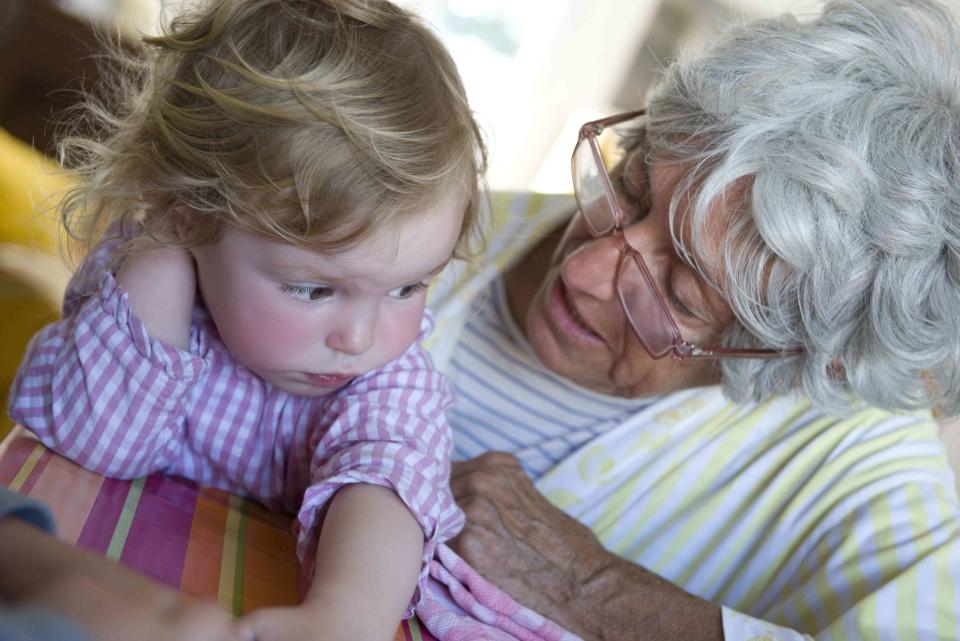TikTok Millennial Mom Worries Her Boomer Parents Will Pass Anxiety Down to Her Kids
But how do you balance child care needs with this concern?

PhotoAlto/Jerome Gorin / Getty Images
Fact checked by Sarah Scott
By now it should come as a surprise to no one that parenting has vastly changed across generations. The internet has become a place where people can connect through shared experiences and sometimes, well…shared traumas.
So when millennial parent Gabi Day (@itsgabiday) took to TikTok looking for people who could relate to her “boomer” mom’s love language, the video very quickly took off.
In the video, Day describes her mother’s love language as “anxiety AT you.” While she went on to explain a little bit more about how she understood that her mom's worries and anxieties growing up always came from a place of love and caring, she found it “beyond exhausting” as a child and now even into adulthood. "My sister and I then absorbed that energy and, surprise, we are anxious adults," she says.
Now a mom of 18-month-old twins, Day worries about her mother's anxieties passing on to her children as well. Describing a scenario in which one of her children fell a few inches off their Nugget couch onto the floor Day says her mother reacted with gasps and exaggerated physical reactions further unsettling the toddler. In contrast, as a mom, Day says she tries to model emotional regulation for her children which in her mother's eyes translates to “not caring enough”.
If this isn’t the most relatable thing I have seen on social media in months I’m not sure what is. The internet agrees as the video has amassed over 1.4 million views and almost 6,000 comments.
"My mom thinks that her anxiety is proof of her love. The more she wrings her hands, the more she loves you,” one commenter writes.
“The way that Gasp is so triggering for me. Thank you for putting this into words,” another adds.
I am a millennial mom of three raised mainly by my grandmother who is a part of the boomer generation. “Anxiety at” is her primary form of communication. Whether it's taking the same subway that I’ve taken for decades living in NYC or one of my kids “climbing too high” at the playground, she never fails to remind me of what could go wrong and has very big reactions to things I see as under control. Like Day, I know that these reactions come from a place of love but it becomes very easy to grow weary when you’re trying to keep it together for multiple people all at once.
“I’d never heard of boomer panic prior to this but it does make a lot of sense considering how anxiety and other mental health conditions have not only genetic but environmental ties,” says Chelsey Molina, MSW, a counselor with The Helen Gordon Davis Centre for Women, Inc. “Some behaviors are learned and anxiety can be one of these learned behaviors, especially with children who have anxious parents”.
Balancing Childcare Needs With Anxiety Concerns
More often than not children are a product of their parents. So it’s safe to say that our parents have their own set of traumas and experiences they’ve lived through turning them into the parents that they’ve become.
“Validating the experiences that our boomer parents had is one way to connect with them on an emotional level first,” Molina shares with Parents. “Also modeling our parenting style to our parents can be super helpful. Showing our parents how we show up for our kids in ways that support and empower them during situations that would normally make them (the parent and even the child) anxious”.
Setting boundaries is an extremely important part of parenting and it may be time to have that conversation with your own parents if they help out in the childcare department.
“When having a conversation with anyone, especially your parents or elders, it’s important to try to be empathetic and know that they come from a place of love and possibly trauma. However, in doing so, you also have to make sure that you’re assertive in expressing your feelings and set boundaries on what you want and feel is best for your child(ren)” says Kadesha Adelakun, LCSW, RPT-S, PMH-C, the Owner/Director of The Journey Counseling Services, LLC. “Remind them that, like them, you care for and love your child(ren), and will never do anything to harm them.”
When it comes to raising children I think that parents and grandparents may use different methods but have the same goal in mind. Raising happy, well-rounded, and successful children is all we can hope for.
“The best way that I’ve found to have this conversation is to be honest with your parents about how you’re choosing to raise your kids and holding a firm boundary,” Molina says.
For more Parents news, make sure to sign up for our newsletter!
Read the original article on Parents.

